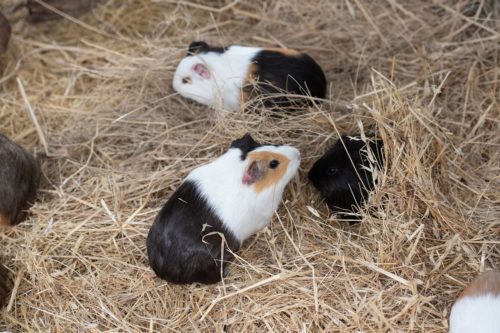
Our exotic pet veterinary nurse Lynzi has written an article to help keep your small furry pets snug as a bug this winter…
Did you know that while rabbits cope with cold weather quite well, guinea pigs don’t like it at all and should be brought indoors and, in winter, ferrets can be prone to getting the flu? This guide is full of tips and practical ideas to keep your small furries safe this winter.
- With their fluffy coats and thick fur pads on the bottom of their feet, outdoor rabbits can manage colder temperatures quite well – as long as they have adequate shelter. Outdoor pet bunnies can be housed in a shed or outbuilding during the winter, with space to run about inside when it’s wet and chilly. During cold snaps you can use pet-safe heat pads that you can warm up in the microwave each evening for them to lie on. If your rabbits are old or thin the RSPCA recommends you move them inside the house. Indoor rabbits will not cope outside at all as they won’t have built up their thick coat or defences against the cold.
- Guinea pigs don’t really like the cold and need to come inside in the winter. Create a quiet, cosy space for them in a porch or utility room. You can even provide them with a “pigloo” each. They are made from a durable cotton outer and fleece lined inside so your piggies can snuggle in out of the cold.
- Ferrets are more tolerant of cold than heat, but if kept outdoors, they need to be in a shed with a pet-safe heater to ward off the wintry chill.
- Hamsters, rats, mice, gerbils, degus and chinchillas may also need some extra warmth to help them through the bleak midwinter. Move their accommodation away from drafts – cold air from windows and doors can give small pets a chill. Choose somewhere secure where they can stay warm without overheating. Provide extra bedding to snuggle into on cold days – and change it regularly to keep things fresh and dry.
- Add extra insulation – add extra layers of newspapers to the floor and change daily. Add extra hay to sleeping areas for added warmth. Do not give blankets to rabbits as chewed blankets can result in foreign bodies and blockages. Guinea pigs and ferrets however love a fleecy blanket or snuggle sack.
- Water – check water a few times a day to ensure it isn’t too cold or hasn’t frozen. Also check the metal water spout hasn’t iced up. Wrapping water bottles in bubble wrap or socks can help.
- Keep the elements out – the whole enclosure should be protected at all times from the rain and wind. Tarps can be bought at most garden centres, best to buy ones with eyelets so they can be fastened onto your enclosure.
- Up the rations – small pets may need a little more food in winter to maintain their body condition, so allow this when serving up their daily nuggets (and hay for rabbits and piggies).
- Enjoy special pet time every day – interacting with their human is often a highlight of a small pet’s day and is even more important in winter when the days are short and life can get a bit boring. Keep daily feeding and exercise times consistent and schedule in some time every day for play, grooming and some extra special attention.
